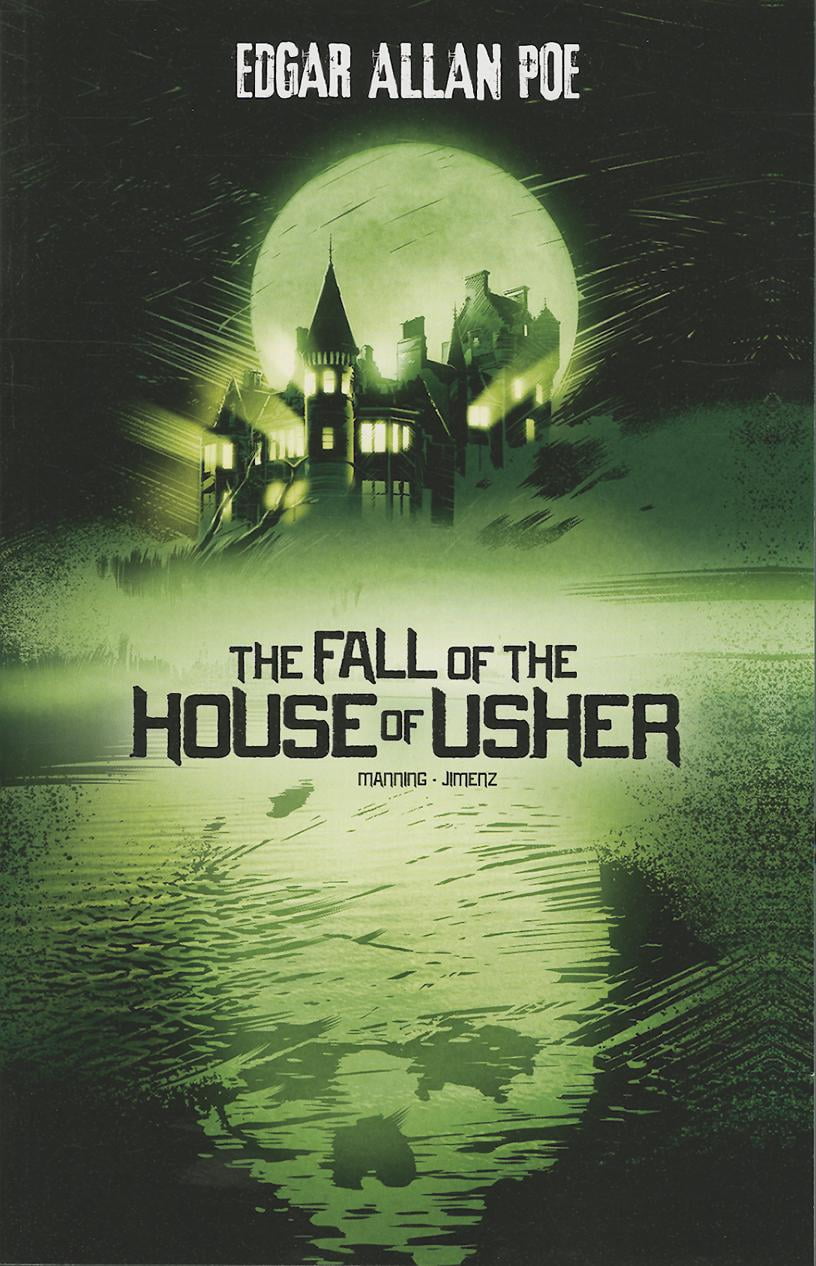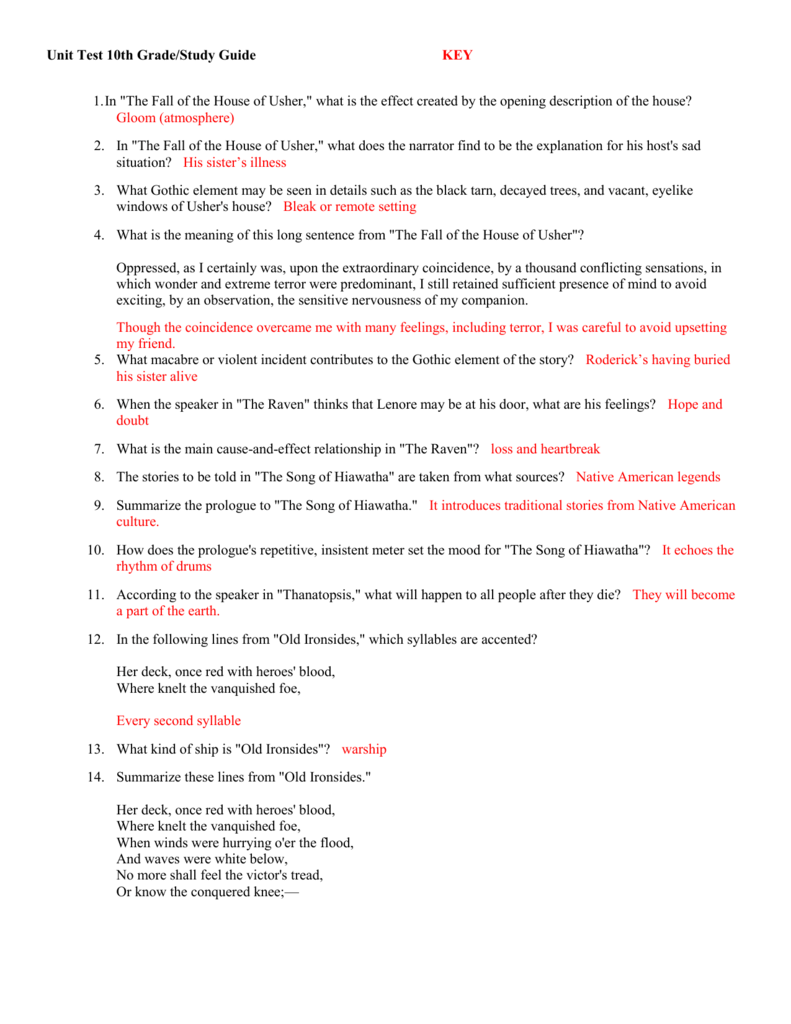Table Of Content

The small crack that the narrator sees when he enters the house foreshadows the fall of the house. Since from the beginning of the story, the readers see that there is something wrong with the house, and certainly, the fissure/crack splits the house and destroys it. The overpass of the border is vitally related to the Gothic horror of the story.
Your password reset email should arrive shortly.

He admits that he is superstitious aboutthe house, and that its continual gloom has broken him down. Usher states thathe and his sister, Madeline, are the last of the line of Usher, and thatMadeline is sick with a disease the doctors cannot diagnose. Like so many of Poe's stories, the setting here is inside a closed environment. Poe was often dismissed by contemporary literary critics because of the unusual content and brevity of his stories. When his work was critically evaluated, it was condemned for its tendencies toward Romanticism. The writers and critics of Poe’s day rejected many of that movement’s core tenets, including its emphasis on the emotions and the experience of the sublime.

Madness
For some of the widely differing interpretations, the reader should consult the volume Twentieth-Century Interpretations of Poe's "Fall of the House of Usher." One key to the story is, of course, the name of the main character. Thus, the narrator is ushered into the house by a bizarre-looking servant, and he is then ushered into Roderick Usher's private apartment and into his private thoughts. Finally, usher also means doorkeeper, and as they had previously ushered Lady Madeline prematurely into her tomb, at the end of the story Lady Madeline stands outside the door waiting to be ushered in; failing that, she ushers herself in and falls upon her brother. In “The Fall of the House of Usher,” the setting, diction, and imagery combine to create an overall atmosphere of gloom.
Symbolism, Imagery, Allegory
The overarching narrative of The Fall of the House of Usher loosely follows Poe's 1839 short story of the same name, with Roderick recounting his decades-spanning tale to Auggie inside his decrepit childhood home. The letters of Roderick ushers the narrator into an unknowable world. And maybe the presence of narration – an outsider – leads to the destruction of the house.
Popular pages: Poe’s Short Stories
Madeline also suffers from problems typical for women in -nineteenth--century literature. She invests all of her identity in her body, whereas Roderick possesses the powers of intellect. In spite of this disadvantage, Madeline possesses the power in the story, almost superhuman at times, as when she breaks out of her tomb. She thus counteracts Roderick’s weak, nervous, and immobile disposition. Some scholars have argued that Madeline does not even exist, reducing her to a shared figment Roderick’s and the narrator’s imaginations.
Bibliography and Further Reading
This would account for his paleness and would fit this story in a category with the stories of Count Dracula that were so popular in Europe at the time. In this interpretation, Roderick Usher buries his sister so as to protect himself. Vampires had to be dealt with harshly; thus, this accounts for the difficulty Lady Madeline encounters in escaping from her entombment.
Literary significance and criticism
He is sick, it is suggested, because he expects to be sick based on his family’s history of illness and is, therefore, essentially a hypochondriac. Similarly, he buries his sister alive because he expects to bury her alive, creating his own self-fulfilling prophecy. The story explicitly ties the physical House of Usher to the Usher lineage, stating that the peasants in that domain use the phrase “House of Usher” for both. However, the connection between the house and the family runs deeper than linguistic shorthand. The decrepit house acts as a physical manifestation of the Usher family. The narrator observes the house as having an almost human-like quality, describing its windows as “eye-like.” Just as Roderick appears to radiate his own melancholy, so too does the house have a depressing air.
'The Fall of the House of Usher' is Poe-try in motion : Pop Culture Happy Hour - NPR
'The Fall of the House of Usher' is Poe-try in motion : Pop Culture Happy Hour.
Posted: Thu, 12 Oct 2023 07:00:00 GMT [source]
The decrepit interior reflects thestate of mind of both Roderick and Madeline as isolation eats away at theirsanity. The house eventually sinks into the tarn, signifying the end of theUsher line. The symbolism of the house and the family highlight the fact thatall things decay. In a shocking development, Madeline breaks out of her coffin and enters the room, and Roderick confesses that he buried her alive.
He does not know much about the house of Usher and is the first outsider to visit the house in many years. The characteristic element of Poe’s work is the presence of capacious and disintegrating houses; such houses in the stories symbolize the destruction of the human soul and the human body. After looking at the reflection of the mansion in the tarn, or small lake,in front of the estate, the narrator believes he sees a heavy mist and vaporrising from the trees and house. He then takes a closer look at the ancientmansion and sees a crack zigzagging from the roof to the foundation, where itdisappears into the tarn’s shore. The Martian Chronicles, a 1950 collection of stories by Ray Bradbury, contains a novella called "Usher II," a homage to Poe.
The narrator flees the house and looks back to see it sinkinto a swamp. Rather than convey a lesson, Poe's story explores gothic elementsof the supernatural and evil to convey this tale of horror. A childhood companion of Roderick Usher, who has not seen him years, is summoned to the gloomy house of Usher to comfort his sick friend. The decayed mansion stands on the edge of a tarn, and is fungus-grown and dreary. Roderick and his twin Madeline are the only surviving members of the family, and both suffer serious physical and nervous maladies. Roderick entertains his friend with curious musical and poetic improvisations, indicating his morbid tastes by his choice of reading Madeline in a cataleptic trance, is thought to be dead, and her body is placed in the family vault.
On the one hand, the house itself appears to be actually sentient, just as Roderick claims. Its windows are described as “eye-like,” and its interior is compared to a living body. On the other hand, there are plenty of strange things about the Usher family. For one, “the entire family lay in the direct line of descent,” meaning that only one son from each generation survived and reproduced. Poe implies incestuous relations sustained the genetic line and that Roderick and Madeline are the products of extensive intermarriage within the Usher family. However, while Poe’s story is a success for its overall effect, the problemthat exists in his credo extends into the story—that is, reason and probabilityare treated as unimportant.
“The Fall of the House of Usher” is an account of a family that is self-isolated, bizarre, and so remote from normalcy that the very existence of this family has become supernatural and eerie. The bond between the brother and sister is inexplicable and intense. One can interpret that twin siblings are actually one person that is split into two.
The narrator tells him that such gas is natural; there is nothing uncommon in it. The short story “The Fall of the House of Usher” is regarded as the best example of the totality of Poe as every detail and element in the short story is relevant and related. A storm begins, and Roderick comes to the narrator's bedroom (which is situated directly above the house's vault) in an almost hysterical state. Throwing the windows open to the storm, Roderick points out that the lake surrounding the house seems to glow in the dark, just as Roderick depicted in his paintings, but there is no lightning or other explainable source of the glow. The Fall of the House of Usher, supernatural horror story by Edgar Allan Poe, published in Burton’s Gentleman’s Magazine in 1839 and issued in Poe’s Tales of the Grotesque and Arabesque (1840).
Poe’s experience in the magazine industry makes him excessively obsessed with word games and codes. It is actually the act of crossing a border that carries the narrator into the tenacious world of Madeline and Roderick. Edger Allan Poe also creates a claustrophobic sensation in his story. The narrator of the story is trapped in the charm of Roderick’s attraction, and he cannot escape it until the house of Usher completely collapses.

No comments:
Post a Comment